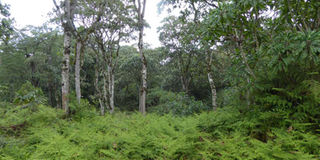National government holds ownership of water resources on behalf of the citizenry

Inside Kinale Forest in Gatamaiyu Forest Nature Reserve in the Aberdare Ranges. FILE PHOTO
What you need to know:
- Water resources belong to the people of Kenya irrespective of whether the water passes through their locality or not.
- Reserve water, which is usually not allocated, caters for ecological sustainability, environment and basic human needs.
Water shortage is a serious dilemma not only in Kenya but also in other parts of Africa.
South Africa recently declared a state of emergency with regards to water shortages in Cape Town, and issued a directive that allows the residents to use only 50 litres of water a day per household.
Besides the public health, agriculture, energy and development challenges posed by the shortage, there is a silent fear of day zero reaching on May 2018 if the anticipated rains delay.
While the situation in Kenya may not be as grave, there is need to be cognisant of the possible looming threats to water shortages in the country, and take collective responsibility to ensure we all safeguard our precious water resources.
OWNERSHIP
Kenya has limited freshwater endowments and is already classified as a chronically water scarce country in absolute and relative terms (National Water Master Plan, 2010).
The country’s per capita water availability is less than 643m³, and is expected to drop in the next seven years as a result of urbanisation, increased population growth, climate change impacts, increased demands for agriculture, industrialisation, among other competing needs.
Amidst the challenges experienced in water issues, it has been noted with concern that some county governments have sought to “own” water resources falling within the geographic boundaries of their counties.
This begs the question: Who owns water resources in Kenya?
Section 5 of the Water Act 2016 posits that every water resource is vested in and held by the national government in trust for the people of Kenya.
COUNTIES
Article 260 of the Constitution Kenya 2010 defines land to include any body of water on or under the surface and marine waters in the territorial sea and the exclusive economic zone.
Article 62 (3) provides that the public land shall vest in and be held by the National Government in trust for the people of Kenya.
Thus, water resources belong to the people of Kenya irrespective of whether the water passes through their locality or not.
Water Resources Authority is the agent of the national government in the regulation, management and use of water resources.
It is therefore illegal for communities or counties to lay claim over water resources.
The role of the county governments in respect to the use of water resources as contemplated under the Constitution is implementation of specific National Government policies on natural resources and environmental conservation, including soil and water conservation.
RESOURCE ALLOCATION
The WRA works with stakeholders including the county governments in development and implementation of the Basin Area Water resources Management Strategies for their catchments.
Citizen participation at the grassroots is ensured through the Water Resources Users Associations (WRUAs), which are voluntary community groups comprising of various water users, including riparian land owners and other water users.
There have been past collaborative successes recorded, including the ongoing process of gazetting Lamu sand dunes and Kikuyu ground water conservation area as protected catchments.
The WRA endeavours to equitably allocate water resources to all users through permitting thus ensuring there is fair, transparent and participatory apportionment of water resources among the diverse water users.
WATER STORAGE
In principal, reserve water, which is usually not allocated, caters for ecological sustainability, environment and basic human needs.
All other needs are allocated and clustered on class basis.
In a bid to further abate water conflicts witnessed during drought, WRA develops abstraction schedules to allow for equitable accessibility to all water resource users with priority given to domestic water use.
This is done in collaboration with WRUAs, abstractors and local administration.
It is also mandatory for all abstractors to have alternative storage facilities to use during low flows so as to let the water resources maintain their reserve flows.
RATIONING
Unfortunately, these measures are in reality not complied with to the optimum thereby impacting negatively on quantity and quality of water.
As a public resource, positive concerted efforts from all stakeholders are key towards maintaining the security of water resources in our country.
Isiolo River system has an operating rationing programme where water users from three zones abstract water on alternate days in the week.
A similar programme is being implemented in other vulnerable river systems.
Mr Shurie is the chief executive, Water Resources Authority. [email protected]




